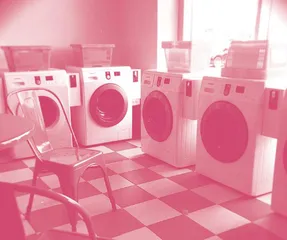Washing Machines Reveal How Trade and Competition Are Linked洗衣机揭示贸易与竞争的关联
作者: 刘洁茹 石小军

American washing-machine makers received a parting gift from President Donald Trump. Days before leaving office, he extended tariffs on imported machines by two years. The move was a victory for Whirlpool, an appliance-maker that has sought protection for nearly a decade. The saga is a case study of the impact of protectionism on competition at home.
美国洗衣机制造商收到了总统唐纳德·特朗普的临别赠礼。特朗普在行将离任前把进口机器的征税期限延长了两年。对于家电制造商惠而浦来说,这一赠礼代表一种胜利,因为它近10 年来一直在寻求政府保护。这一事件也反映出保护主义对美国国内竞争的影响。
American businesses can ask the government for three types of protection from foreign rivals: anti-dumping duties1, if imports are being sold below cost; countervailing duties2, if foreign competition is subsidised; or safeguard tariffs3, if imports are surging. Petitions succeed around 60% of the time; in 2016 just over 7% of America’s product lines were affected by a temporary trade barrier. (That compares with about 4% in the European Union.)
为免受国外对手的威胁,美国企业可以向政府寻求三类保护:如果进口商品的销售价格低于成本,可寻求反倾销税保护;如果国外竞争对手享受到补贴,可寻求反补贴税保护;如果进口商品数量暴增,可寻求保障性关税保护。成功获得保护的概率目前约为60%;2016年,仅略超7% 的美国产品线受到了临时性贸易壁垒的影响。(与之相比,欧盟约有4%。)
When Whirlpool first sought help in 2011, it accused its South Korean competitors, Samsung and LG, of selling at prices that were too low. (Its rivals said its failure to innovate was the problem.) The United States International Trade Commission (USITC), which follows trade-remedy law written to protect producers, not consumers, found for Whirlpool. That led to tariffs of up to 82% on some washing machines from South Korea and Mexico (where Samsung had a factory).
2011 年,惠而浦第一次向美国政府寻求帮助,当时它控告韩国竞争对手三星和LG 以极低的价格销售产品。(惠而浦的对手则认为未能创新才是惠而浦的问题所在。)美国国际贸易委员会(USITC)遵照保护产品生产者而非消费者的贸易救济法,作出了有利于惠而浦的裁决,导致自韩国和墨西哥(三星在墨西哥有工厂)进口的几款洗衣机的关税上涨至82%。
Only six years before that, Whirlpool had used the promise of competition from Samsung and LG to justify consolidation at home. Trustbusters had been suspicious of its acquisition of Maytag, an American rival, which united more than 70% of domestic production of household washing machines. But, partly because they were assured of stiff foreign competition, they let the deal go ahead. William Kovacic, then a member of the Federal Trade Commission, was so peeved4 by the case that he now argues that merger approvals should require companies to waive5 their right to seek tariff protection.
这之前, 就在2005年,惠而浦曾以即将面临来自三星和LG的竞争为由在国内实施合并。当时惠而浦通过收购国内对手美泰克,整合了国内超过70% 的家用洗衣机市场,反托拉斯者曾对此提出质疑。但他们最后还是默认了这项合并,部分原因是他们确信来自国外的竞争十分激烈。时任美国联邦贸易委员会委员威廉·科瓦契奇当时就对合并感到非常愤怒,他现在主张,企业要想合并就必须放弃寻求关税保护的权利。
But the duties Whirlpool had secured were easy to dodge. When Samsung and LG started sending machines from their factories in China to America, Whirlpool asked the USITC to hit imports from there, too. Accused of undercutting6 again, the South Korean firms protested that “bundled pricing” distorted the facts. Washing machines often looked like they were sold at low margins, but in fact were being bundled together with driers, which were sold at high margins. When seen as an integrated unit, an apparently low-return washing-machine business could in fact be making adequate profits. But the commission ruled in favour of Whirlpool again.
但惠而浦争取到的关税很容易规避。当三星和LG 开始从中国的工厂向美国销售洗衣机时,惠而浦又要求USITC对它们征税。由于再次被控削价竞争,这两家韩国企业提出抗议,表示“捆绑定价”歪曲了事实。洗衣机通常看起来利润很低,但事实上它们会与高利润的烘干机捆绑销售。如果把洗衣机和烘干机看作一个整体,那么看起来回报非常低的洗衣机生意实际可能赚取足够多的利润。而委员会再次作出了有利于惠而浦的裁决。
The source of imports had already changed, though—to Thailand and Vietnam. So, rather than continue with the game of whack-a-mole, in 2017 Whirlpool made a bolder request: for a safeguard tariff, which hits imports whatever their source. (It is also temporary, to give domestic firms time to become competitive.) The USITC recommended tariffs of 20%, rising to 50% above a quota of 1.2m units in the first year, with the protection fading over three years. Presidents can veto such requests, but Mr. Trump did not.
然而,进口洗衣机的原产地已转向了泰国和越南。于是,惠而浦不再玩打地鼠游戏,即逮着冒头的打,而是在2017年提出了一个更大胆的请求:不管进口洗衣机来自哪里,均要对其征收保障性关税。(这也是暂时性的,为的是给美国国内企业时间提高自身竞争力。)USITC 建议, 第一年对数量在120 万台以内的进口洗衣机征收20% 的关税,超过120 万台的则征税50%,3 年内逐步降低税率。总统可以否决此类要求,但特朗普没有这么做。
The new restrictions were implemented in February 2018. As the law intended, imports fell, and American production rose. According to a study by Aaron Flaaen of the Federal Reserve and Ali Hortaçsu and Felix Tintelnot of the University of Chicago, retail prices of washing machines also rose, by 12%—with those of dryers rising in step. Whirlpool made some investments, including in a new training centre7 in Clyde, Ohio. A review of the tariffs in 2019 found that its profitability increased.
2018年2月, 新的限制条例开始实施。正如该条例所愿,美国进口洗衣机数量下降,国产洗衣机数量增多。联邦储备委员会经济学家亚伦·弗拉恩、芝加哥大学经济学教授阿里·霍尔塔奇苏和费利克斯·廷特尔诺特的研究显示,洗衣机的零售价也上涨了,涨幅为12%;烘干机的价格同步上涨。此外,惠而浦进行了一些投资,包括在俄亥俄州克莱德新建了一家员工培训中心。2019 年的一份关税调查报告显示,惠而浦的盈利能力有所提高。
Yet Whirlpool came back for more. In November last year its lawyers complained that the tariff was meant to give it three fat years of profits to recover from the harm caused by imports. But Samsung and LG had brought in machines before the tariff came in, dampening its effect. Then came covid-19. Had the USITC known what market conditions would be, Whirlpool’s lawyers argued, it would surely have recommended greater protection.